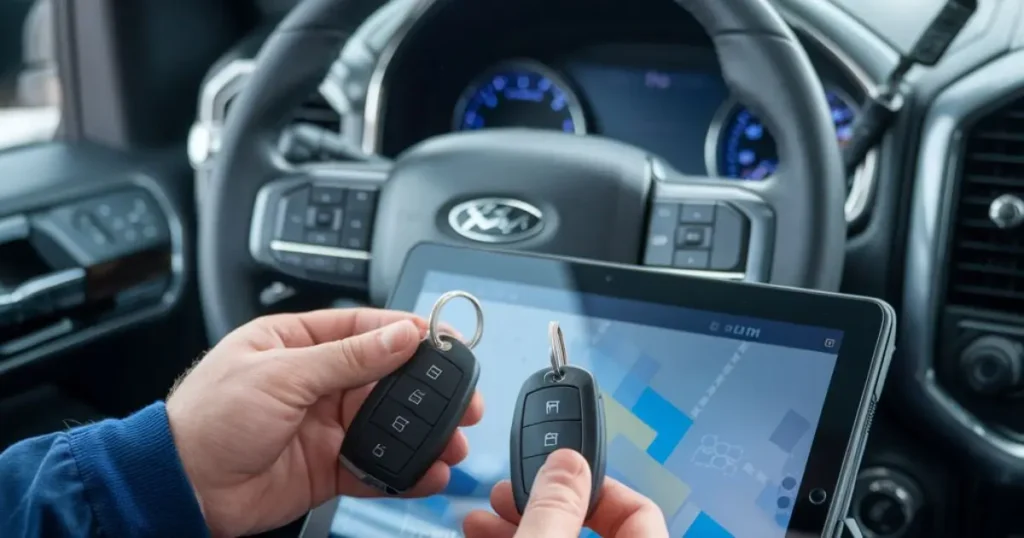Locksmith business is more than just keys and locks—it’s a thriving industry adapting to the demands of an increasingly security-conscious world. Here’s a compelling figure: the global smart lock market is projected to hit $4.4 billion by 2027, growing at an impressive pace. This isn’t just a business; it’s an opportunity to innovate while solving everyday problems for people and companies alike.
Whether you’re intrigued by the craft or eyeing a lucrative venture (annual revenues can range from $40,000 to $100,000), starting a locksmith business is your key to unlocking both. In this guide, we’ll show you exactly how to make it happen—from obtaining the right licenses and tools to mastering marketing strategies and pricing your services competitively. Let’s get started!
Table of Contents
Get the Required Licenses and Certifications
A solid foundation is crucial for any business, and a locksmith business is no exception. Before you cut your first key or install your first smart lock, you’ll need to tackle the legal and professional requirements that come with the trade. Licensing and certifications aren’t just hoops to jump through—they’re your ticket to credibility, trust, and long-term success.
Here’s the first step: check your state’s requirements. In the U.S., licensing laws vary widely. For example, states like California, Texas, and New York have some of the strictest regulations. These often include background checks, mandatory training, and passing a certification exam before you can legally operate your locksmith business. Skipping these steps isn’t just risky; it could cost you your reputation and hefty fines.
States with Licensing Requirements
- California: Requires locksmiths to register with the Bureau of Security and Investigative Services (BSIS). This includes fingerprinting and completing a thorough background check.
- Texas: Operates under the Texas Department of Public Safety, which mandates training and an exam for all locksmiths.
- New York: Requires city-specific licensing in some cases, like New York City, which has its own set of strict standards.
Don’t operate in one of these states? That doesn’t mean you’re off the hook. Even if your state doesn’t require a license, consider obtaining professional certifications.
Certifications That Build Trust
In an industry built on security and trust, certifications give you an edge. Organizations like the Associated Locksmiths of America (ALOA) offer industry-recognized credentials such as:
- Certified Registered Locksmith (CRL): Great for beginners. It proves foundational knowledge in key duplication, lock picking, and installation.
- Certified Master Locksmith (CML): A prestigious title that showcases expertise across advanced locksmithing techniques and high-security systems.
Even if your state doesn’t demand it, these certifications are often what separates a professional locksmith business from the competition. Clients notice when you go the extra mile, and so do commercial partners who might need your services.
Pro Tip: Staying updated with industry certifications like Certified Registered Locksmith (CRL) or Certified Master Locksmith (CML) can open doors to specialized opportunities.
Define Your Locksmith Business Niche
The locksmith industry is vast, but trying to do it all from the start is a recipe for burnout. Choosing a niche is one of the smartest moves you can make for your locksmith business. It allows you to stand out in a crowded market, focus your resources, and become the go-to expert in your area of specialization.
Here’s a key fact: businesses that target a specific niche are 60% more likely to attract loyal customers. Why? Because specialization breeds trust. People want to work with locksmiths who know their unique needs inside and out.
Popular Locksmith Niches
Think about the services you’re most passionate about and the customers you want to serve. Consider exploring these popular niches:
| Specialization | Services Offered | Target Customers |
|---|---|---|
| Residential Locksmith | Lock installation, repair, and key duplication | Homeowners |
| Commercial Locksmith | High-security locks, access control systems | Businesses and offices |
| Automotive Locksmith | Car key replacement, lockout services | Vehicle owners |
| Safe and Vault Locksmith | Safe opening, repair, and combination changes | Banks, jewelers, and households |
| Electronic Locksmith | Smart locks, electronic keypads | Tech-savvy homeowners and offices |
You can also read: How To Start a Successful Multi-service Business in 2025
Start Small, Then Expand
It’s tempting to offer everything at once, but starting with one or two areas of expertise is a more practical approach. For example, if you specialize in automotive locksmithing, you can focus on mastering car key programming and lockout services. Over time, you might expand to include residential or commercial services as your experience and resources grow.
By narrowing your focus early on, you’ll also be able to streamline your marketing efforts. Imagine targeting tech-savvy homeowners with smart lock solutions versus trying to appeal to every potential client at once. It’s more efficient and way more effective.
Pro Tip: Look for gaps in your local market. Is there a demand for smart lock installations but no one offering them? Are local businesses struggling to find reliable locksmiths for their high-security needs? These opportunities can help you carve out a niche that’s both profitable and in demand.

Develop a Comprehensive Business Plan
Every great locksmith business starts with a plan. Without one, you’re just winging it—and in today’s competitive market, that’s not a risk you can afford. Consider your business plan the roadmap that guides your journey. It tells you where you’re going, how to get there, and how to avoid the potholes along the way.
Here’s why it matters: entrepreneurs with well-crafted business plans are 16% more likely to succeed than those without. That’s a compelling stat, isn’t it? A solid plan isn’t just a document; it’s your blueprint for building a business that thrives. So, what should your roadmap include?
- Executive Summary: Start with the big picture. Your executive summary is a snapshot of your business goals, vision, and mission.
- Company Description: Detail the structure of your locksmith business. Are you operating as a sole proprietor or an LLC? Is your business registered with the relevant authorities? This section reinforces your credibility and showcases what differentiates you from the competition.
- Services Offered: Get specific about what you’ll provide. Will your locksmith business focus on residential services like lock rekeying and emergency lockouts, or will you specialize in commercial and smart lock systems? Defining your services upfront helps identify your target market.
- Market Analysis: Research is your best friend here. Who are your competitors? What are the local trends in security needs? Understanding your customer demographics and market demand positions your locksmith business to thrive in a crowded field.
- Marketing and Sales Strategy: What’s your plan to attract new clients and keep them coming back? Whether it’s through local SEO, social media campaigns, or partnerships with real estate agents, your strategy should outline how you’ll get your name out there. Be specific and action-oriented.
- Financial Projections: Break down the numbers. Include startup costs for tools, equipment, and licensing. Add revenue estimates based on your target market and calculate your profit margins. Investors (or even just you!) need to see how your locksmith business will make money.
You May Like To Read: How to Start a Dog Grooming Business in 2025
Secure Funding for Your Business
Launching a locksmith business isn’t just about having the skills; it’s about securing the resources to get started. From tools to licensing to marketing, the costs can add up quickly. But here’s the good news: with the right funding strategy, you can set yourself up for success without breaking the bank. Here are some funding options:
- Personal Savings: Use personal funds to reduce debt.
- SBA Loans: The Small Business Administration offers loans with favorable terms.
- Bank Loans: Require collateral and a good credit history.
- Investors: Present a solid business plan to secure investments.
Before diving into funding, it’s crucial to understand exactly what you’ll need. Common startup expenses for a locksmith business include:
- Insurance: Liability coverage to safeguard both your business and your clients.
- Tools and Equipment: Key-cutting machines, lock-picking sets, and specialized smart lock tools.
- Licensing and Certifications: Costs vary by state but are non-negotiable.
- Marketing: A website, business cards, and local advertising.
Pro Tip: Combine funding sources to minimize risk. For instance, you could use personal savings to cover smaller expenses while applying for an SBA loan to finance larger purchases. Diversifying your funding ensures you’re not overly reliant on one source.
Essential Locksmith Tools and Equipment
Having the right tools is essential for your success. Here’s what you’ll need:
- Basic Tools: Key cutters, rakes, bumping kits, and key extractors.
- Specialized Tools: Auto entry tools, safe manipulation kits, and electronic lock programming tools.
- Company Vehicle: A reliable van or truck equipped to transport tools and serve clients efficiently.
My Example and Estimation to Help You Identify Costs
Basic Locksmith Tools
Every locksmith starts with basic tools like lock picks, key extractors, and tension wrenches. These tools help you work with different locks and meet customer needs. Having a good set of tools can boost your reputation and work efficiency.
- Lock picks: $8 to $30
- Key extractors: $19 to $27
- Tension wrenches: $9 to $13
- Pliers: $6 to $24
- Screwdrivers: $9 to $49
- Wrenches: $9 to $20
Vehicle and Mobile Setup
Locksmiths who work on-site need a well-organized vehicle. Work vans like the Dodge ProMaster City or Ford Transits have enough space. Adding storage and workspace solutions, like Adrian Steel products, makes your setup efficient and professional.
Key Cutting Machines
These machines are a big investment but essential for your service. They help you make copies and program transponder keys. The Miracle A9 / SEC E9 machine costs over $5,000, but AliExpress has more affordable options.
| Equipment | Price Range |
|---|---|
| Key Cutting Machines | $300 to $1,800 |
| Car Key Programming Tools | $3,000 to $6,000 |
| Entry-Level Car Key Programmers | $200 to $600 |
Pro Tip: Plan for Long-Term Growth While startup costs might seem steep, think of them as an investment in your locksmith business. High-quality tools, a professional mobile setup, and advanced machines allow you to offer reliable, efficient services that keep customers coming back.
Set Competitive and Profitable Prices

Strategic pricing is essential for balancing competitiveness with profitability. Common pricing models include:
- Hourly Rate: Charge based on time plus materials.
- Flat Rate: Fixed prices for specific services.
- Labor and Materials Pricing: Separate charges for labor and materials.
Research local market rates to stay competitive. Consider factors like service complexity, location, and urgency.
Sample Pricing Table:
| Service | Price Range |
| Residential Lock Change | $75 – $200 |
| Automotive Lockout | $50 – $150 |
| Safe Opening | $100 – $400 |
Effective Marketing Strategies for Locksmiths
Building a customer base requires strong marketing strategies:
- Website: Ensure your site highlights services, contact details, and testimonials.
- Local SEO: Enhance your Google My Business profile to boost visibility in local search results.
- Paid Advertising: Leverage Google Ads and Facebook Ads to reach and engage potential customers.
- Social Media: Share daily tips and routines on platforms like Instagram and TikTok. Here is a successful example of a social media account that does a good marketing strategy through social media: accessdeniedcarkeys
- Networking: Build partnerships with local businesses and community organizations.
Pro Tip: Use data analytics to track your marketing ROI and adjust campaigns.
Obtain Necessary Business Insurance
Protect your business with adequate insurance:
- General Liability Insurance: Covers property damage or bodily injury claims.
- Commercial Auto Insurance: Covers vehicles used for business activities.
- Professional Liability Insurance: Protects against claims of errors or negligence in the services you provide.
Consult an insurance broker to customize coverage based on your business needs.
Provide Excellent Customer Service
Exceptional customer service is the cornerstone of a successful locksmith business. Tips include:
- Prompt Service: Arrive on time and respond to emergencies quickly.
- Professionalism: Maintain a courteous and respectful demeanor.
- Transparency: Communicate service details and pricing.
- Quality Workmanship: Ensure every job is completed to the highest standard.
Satisfied customers are the key to repeat business and valuable referrals.
Conclusion
Starting a locksmith business in 2025 is more than just a career choice—it’s an opportunity to build a business that’s both rewarding and in demand. With rising security concerns and the ever-growing need for advanced lock systems, the timing couldn’t be better.
By following the steps in this guide—securing the right licenses, investing in high-quality tools, crafting a solid business plan, and developing a smart marketing strategy—you’re setting yourself up for success. These aren’t just tasks; they’re the foundation of a business that can thrive in a competitive market while delivering real value to your customers.
The path to success starts with that first step. Whether it’s researching certifications or investing in your first set of tools, every move brings you closer to your goal. So why wait? Take action today, and unlock the full potential of your entrepreneurial journey with a locksmith business built to succeed!
To discover more business ideas and success stories, visit our Success section.

